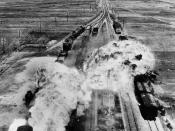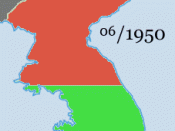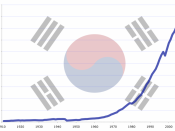Although Acheson's "Defensive Perimeter" speech in Jan 12, 1950 did not include Korea, when the war broke out the US was involved immediately. The aim of this investigation is to find out to what extent did economic reasons influence the USA's decision to go to war in Korea. The main sources will be books that relate to the Korean War. Internet sources will be used if it is necessary for the summary of evidence. In B, the changes of the American economy will be after and before the involvement Korean War, Acheson's "defensive perimeter" speech, and the expansion of communism after WWII. Then I will evaluate the values and limitations of the two Korean books that relate to Korean War with regarding to the extent of economic reason for the USA involvement in Korean War. The possible political and economic reasons why the USA intervened in the Korean War will also be analysed before reaching a conclusion in E.
B Summary of Evidence
The economic situation of the USA from 1940 to 1953.
The USA's economic situation was rapidly growing during the war with Japan because it had put much effort on military spending, and thus decreasing unemployment. However because of the surrender of Japan, the US's economy started to decrease again. The USA saw another chance to have economic growth due to the Korean War. Indeed, the USA's economy started to grow from 1950.
The USA's declaration of war upon Japan in December 8, 1941 led to the growth of its economy. Industrial factories were at first slow to convert to military output, but by 1942, 33% of the economy was devoted to the war effort. Between 1941 and 1945 the US spent approximately $250 million a day in efforts to produce the military products to defeat its enemies.


